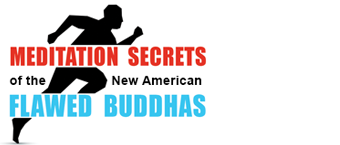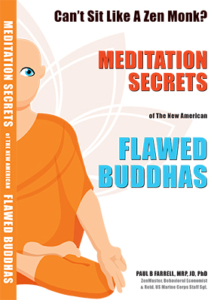Last Updated on February 4, 2021 by Paul Farrell, MRP, JD, PhD

Mindfulness… The seven secrets of knowing that “wherever you go today, there you are”… Awake! Aware! Alive!
“Mindfulness is an ancient Buddhist practice which has profound relevance for our present-day lives.
This relevance has nothing to do with Buddhism per se or with becoming a Buddhist, but it has everything to do with waking up and living in harmony with oneself and the world.
It has to do with examining who we are, with questioning our view of the world and our place in it, and cultivating some appreciation for the fullness of each moment we are alive.”
– Jon Kabat-Zinn, Wherever You Go, There You Are
Most people are sleepwalking through life. We operate on auto-pilot like machines, reacting mechanically to external events according to programs hard-wired in our brains telling us in advance what the world expects of us – from parents, spouses and children, bosses, employees, friends, preachers, politicians, advertisements, newsmakers, and others “out there.”
Most of our lives are controlled by this stimulus-response relationship between our computer-brain and “them.” As a result we respond as expected rather predictably, without critical thinking about our assumptions, values and reality – we are sleepwalking.
Mindfulness is How You are Actually Living
In truth, mindfulness is the one common goal shared by every meditation practice – and as such it is not so much a meditation technique as it is a way of living. In fact, mindful meditation is really only important as a lead-in to mindful living. And conversely, if you are already living in this state of mindfulness in your daily life, then obviously there is absolutely no need for any special sitting meditation techniques, because you’re already living it.
Meditation is not a sport. Nor is it a game. Of course you could look at meditation as a pregame training – for the real game of life. Just remember, you’re not competing to become the Tiger Woods of mindful meditators.
The real goal is to be mindful between meditations, in daily living.
Mindful mediation does its job if it succeeds in waking people up from their sleepwalking state. If you’re already living your life mindfully, then you’re already winning the game and you really don’t have to meditate, do you. Get it?!
The Seven Essential Qualities of Mindfulness
In Full Catastrophe Living: Using the Wisdom of Your Body and Mind to Face Stress, Pain, and Illness, Dr. Jon Kabat-Zinn, director of the University of Massachusetts Stress Reduction Clinic describes the seven qualities of mindfulness living that work as a package. These are the attitudes that mindful meditation will help you develop so that they will gradually become part and parcel of your everyday life:
1. Non-Judgmental
You become an active witness of your experience instead of automatically labeling things based on preconceived ideas or wishful thinking. “The habit of characterizing and judging our experience locks us into mechanical reactions that we are not aware of and that often have no objective basis at all.” This split is a cause of our stress. But unfortunately, this is a tough habit to stop because it is so mindlessly automatic, we don’t even know we’re doing it most the time.
Mindful meditation becomes training camp preparing us for the real game.
2. Patience
I know what you’re thinking, this is a tough one in today’s competitive business world. We want everything now! Patience is a tough one but necessary, a sign of wisdom that we’re accepting life as it unfolds on its own timetable.
Meditation can help us see how our minds waste a lot of time and energy creating unnecessary stress, worrying about the past or wishfully thinking about the future. Stay out of the past, and the future, stay focused only on what you’re doing in the present moment.
3. Beginners Mind
Whether you are handling a difficult situation in business, with some investments, or in your family, “an open, beginner’s mind allows us to be receptive to new possibilities and prevents us from getting stuck in the rut of our own expertise, which often thinks it knows more than it does.” You also increase your chances of getting the answer right.
In Zen Mind, Beginner’s Mind, Suzuki says: “In the beginner’s mind there are many possibilities, but in the expert’s mind there are few.”
4. Trust
One of the great lessons of mindful meditation is “developing a trust in yourself.” On the other hand, sleepwalkers rely so much on external authorities and mental programming that they don’t trust themselves.
The great Buddha himself spoke to this issue: “Believe nothing, no matter where you read it or who has said it, not even if I have said it, unless it agrees with your own reason and your own common sense.”
5. Non Striving
Yes, to succeed in the business world you need goals. And yes, you need to strive to achieve your goals every day and with your life goals. Unfortunately, we often become obsessed and consumed by our goals. They become our life – striving, achieving, accumulating, buying the latest gadgets and keeping up with neighbors.
We are lost without balance. Meditation will help you see how you can succeed by flowing with the river some of the time rather than paddling upstream all the time.
6. Acceptance
Very few people accept reality. Instead, we “often waste a lot of energy denying and resisting what is already fact.” We want things different than they are, but this wishful thinking gets in the way of positive changes.
Acceptance doesn’t mean you have to like it, or have to resign yourself to fate and do nothing to change things. It simply means that you see things as they really are – right now – no matter what the facts are.
7. Letting Go
At the heart of all Eastern meditation practices and their entire way of life is concept of non-attachment, surrendering, detaching, letting go. Buddha’s Four Noble Truths remind us that our lives are filled with frustrations, difficulties and suffering because of our attachments to ideas, beliefs, things, money, careers and people – but there is no permanence in an impermanent world.
Mindful meditation is intended to help you develop all seven of these qualities. But far more important, mindful living means making these qualities part of your daily life, all day, every day – with close friends and loved ones, and with employees and bosses, customers and clients, the clerk in the store and the homeless guy on the street, and everyone else you deal with during the day.
If you are curious, take twenty minutes twice a day, sit quietly and simply witness your mind in action without judgment and without any attachments, and when any thoughts do come across your radar, gently let them go.
Beware of a Mindfulness Guru with the “Stink Of Zen!”

Beware of those that make mindfulness meditation far more complex and esoteric than it need be.
Many gurus in this arena tend to make mindful meditation far more complex and esoteric than it need be. For example, while I was a work scholar at the Big Sur’s Eslaen Institure we were given an opportunity to study Vipassana meditation from an well-known guru. I was very interested, Vipassana is the original meditation technique taught by the Buddha himself twenty-five hundred years ago.
Vipassana is also known as “insight meditation” because as it sharpens our sense of mindfulness, Vipassana brings us greater wisdom and insight into the nature of reality, and it was, therefore, considered a direct path to enlightenment.
About forty of us attended the session. The guru arrived and proceeded with his ten-minute warmup drill as he laid out all his props: An imported rug went down first, then fancy Indian pillows, a small carved mahogany table for sundry artifacts, little bells, incense holders, faux icons, a boom box with Hindu music, a skull cap, a cute shawl was draped over his shoulders to capture the true air of authentic guru spirituality, all while he spoke in a pretentious dialect, as if to let us know that he was more mindful than we were.
I walked out after a few minute of the little drama – my gut told me he had nothing to teach, that he was caught up in what the ancient Zen masters called “the stink of Zen.” But in retrospect, I now see I was looking at my reflection in his mirror. Someone with a true Zen spirit of the beginner’s mind would have stayed, listened, looked deep into that mirror, and learned something … about about the flawed buddha within you. That’s what mindfulness, insight meditation and Vipassana therapy are all about, because everyone is our teacher, everyone.
Searching for Mindfulness Meditation Gurus in India, Finding them in Hollywood
Other masters, experts and authorities on Vipassana insight meditation will promote their classes, retreats, videos and audio tapes by emphasizing that Vipassana is a form of do-it-yourself psychotherapy. While it is true that Buddhist meditations have often been described as the East’s alternative to Western psychotherapy, my experience has been that Eastern gurus and their Western disciples often become too dogmatic and rigid in their practices, with unhealthy results for several people in my life.
If you really want to learn about mindful meditation as a part of living a mindful life, forget about traveling to study with a guru on a mountain top in India or Japan, to get a mega-dose of mindful therapy – go to a Mind/Body and Stress Management Clinic right here in America, maybe in Hollywood, maybe down the street in your home town. Alternatively, a sports psychologist or yoga instructor can save you time and money and very likely produce results, to quiet your “monkey mind.”
About the Author
Dr. Farrell is a Behavioral Economist. His books include The Millionaire Code; The Millionaire Meditation: Stress Management for Wall Street, Corporate America & Entrepreneurs; The Zen Millionaire; The Winning Portfolio; Expert Investing on The Net; Mutual Funds on The Net; and The Lazy Person’s Guide to Investing.
He also published 1,643 columns on DowJones-MarketWatch and for years was their #1 traffic-generating columnist. Before the Internet, he edited & published FNX: Future News Index, a financial newsletter for stock market traders. Earlier he was a Wall Street investment banker with Morgan Stanley, Executive Vice President of the Financial News Network; and Associate Editor of the Los Angeles Herald Examiner.
He has a Doctorate in Psychology, Juris Doctor, Masters in Regional Planning and Bachelor of Architecture. He worked on the Esalen organic farm and served in the U.S. Marine Corps as Staff Sergeant in aviation computer technology.








